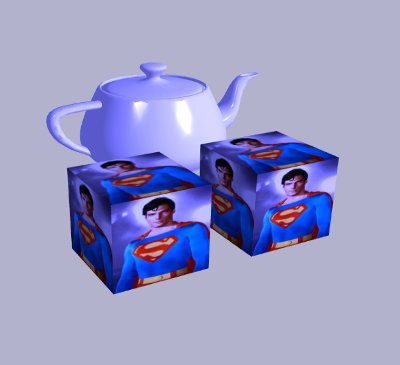-
Notifications
You must be signed in to change notification settings - Fork 165
Creating a Scene
A scene graph is a data structure that arranges the logical and spatial representation of a graphical scene as a collection of nodes in a graph, typically a tree. Scene graphs can provide a convenient abstraction on top of low-level graphics APIs (such as WebGL) that encapsulates optimisations and API best practices, leaving the developer free to concentrate on scene content.
A key feature of most scene graphs is state inheritance in which child nodes inherit the states set up by parents (e.g. coordinate spaces, appearance attributes etc).
For SceneJS, a benefit of scene graphs is modularity, where JSON subtrees can be complete reusable components, and brevity, where state may be reused by wrapping it around many child nodes.
The snippet below is an example of a 3D scene created with SceneJS. The scene graph is a directed acyclic graph expressed in JSON, in this case defining a scene containing a blue teapot and two boxes sharing the same textured appearance. Geometry nodes are normally at the leaves, where they inherit the state defined by higher nodes, in this case the material and rotation transform.
var scene = SceneJS.createScene({
nodes: [{
type: "material",
id: "myMaterial",
color: {
r: 0.5,
g: 0.5,
b: 1.0
},
nodes: [{
type: "texture",
layers: [{
src: "../../textures/superman.jpg"
}],
nodes: [{
type: "translate",
id: "firstBoxPos,
x: -3.0,
y: 1.0,
z: 5.0,
nodes: [{
type: "prims/box"
}]
}, {
type: "translate",
y: 1.0,
z: 5.0,
nodes: [{
type: "prims/box"
}]
}]
}, {
type: "prims/teapot"
}]
}]
});SceneJS parses that description to create the 3D scene shown below:
We can animate one of those translate nodes like this:
scene.getNode("firstBoxPos",
function (firstBoxPos) {
var y = 1.0;
var inc = 0.02;
scene.on("tick", function () {
firstBoxPos.setY(y);
y += inc;
if (y > 5 || y < 1.0) {
inc *= -1.0;
}
});
});Adding nodes to the scene is as simple as:
scene.getNode("myMaterial",
function(myMaterial) {
myMaterial.addNode({
type: "translate",
x: 5,
nodes: [
{
type: "prims/torus"
}
]
}
});
});Remove nodes like this:
scene.getNode("myMaterial",
function(myMaterial) {
myMaterial.destroy();
});